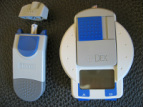
Type 2 diabetes is a genetic and lifestyle-related condition often attributed to years of unhealthy diet, coupled with lack of regular exercise. Although onset is gradual, once the condition develops it cannot simply be eliminated through changing habits that led to its development. Successful treatment requires a multi-level effort on the part of the patient, under supervision of a qualified endocrinologist.
The initial goal of diabetes treatment is to lower blood glucose levels to safe levels through undertaking sufficient regular exercise and altering diet around low-carbohydrate principles. It often takes patients several months to fully learn diabetes management skills as they involve a complex combination of food portion management; medication self-administration; recognizing and treating high glucose levels; handling and storing diabetes medical supplies; and coping techniques for sick days.
A critical aspect of successful diabetes management is self-monitoring of blood glucose (SMBG). This involves utilizing a glucose meter to take an accurate blood sugar reading. Although there are several types of glucose meters, they generally involve pricking the finger with a lancet, or small needle. The tiny resultant blood drop is placed on a test strip, which the glucose meter reads and processes digitally. Results of SMBG tests are usually available in a few seconds. The frequency with which blood testing must be undertaken depends on whether the patient has diabetes under control. Individuals just starting out on a SMBG regimen should utilize the glucose meter once or twice a day, while those with blood glucose levels that are under control can check a few times a week.
In addition to eating healthy foods, eating at roughly the same time each day is an important part of diabetes control. Consistency with foods eaten and portion sizes helps lessen blood glucose level ranges. Consult regularly with an experienced physician or nurse to determine the correct combination of proteins, carbohydrates, and fat intake for your particular situation. If you are obese, and diabetic conditions persist despite improved diet and medication regimens, consult with a physician about the possibility of bariatric, or gastric bypass surgery.
The initial goal of diabetes treatment is to lower blood glucose levels to safe levels through undertaking sufficient regular exercise and altering diet around low-carbohydrate principles. It often takes patients several months to fully learn diabetes management skills as they involve a complex combination of food portion management; medication self-administration; recognizing and treating high glucose levels; handling and storing diabetes medical supplies; and coping techniques for sick days.
A critical aspect of successful diabetes management is self-monitoring of blood glucose (SMBG). This involves utilizing a glucose meter to take an accurate blood sugar reading. Although there are several types of glucose meters, they generally involve pricking the finger with a lancet, or small needle. The tiny resultant blood drop is placed on a test strip, which the glucose meter reads and processes digitally. Results of SMBG tests are usually available in a few seconds. The frequency with which blood testing must be undertaken depends on whether the patient has diabetes under control. Individuals just starting out on a SMBG regimen should utilize the glucose meter once or twice a day, while those with blood glucose levels that are under control can check a few times a week.
In addition to eating healthy foods, eating at roughly the same time each day is an important part of diabetes control. Consistency with foods eaten and portion sizes helps lessen blood glucose level ranges. Consult regularly with an experienced physician or nurse to determine the correct combination of proteins, carbohydrates, and fat intake for your particular situation. If you are obese, and diabetic conditions persist despite improved diet and medication regimens, consult with a physician about the possibility of bariatric, or gastric bypass surgery.
IMAGE ATTRIBUTES
Use of a Glucometer for Measuring Blood Glucose Levels is an Important Part of Diabetes Management. Posted at Wikimedia Commons.
Use of a Glucometer for Measuring Blood Glucose Levels is an Important Part of Diabetes Management. Posted at Wikimedia Commons.
 RSS Feed
RSS Feed